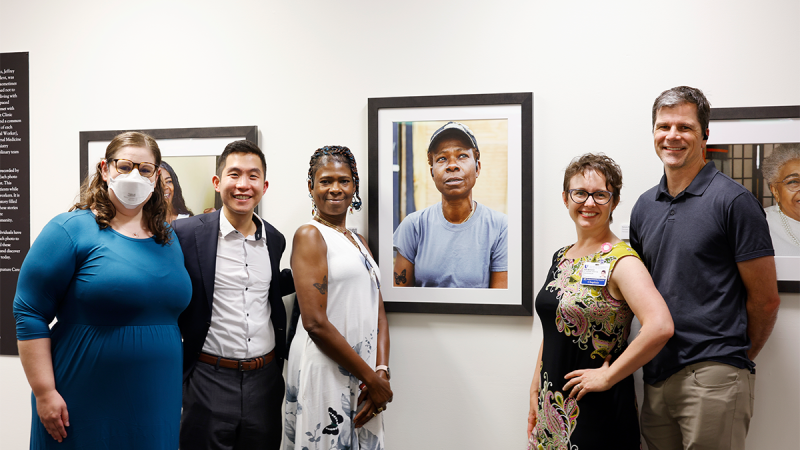
Giving Voice to Patients’ Untold Stories
As a first-year internal medicine-psychiatry resident, Jeffrey Lee, MD, yearned to get to know his patients at the Duke Outpatient Clinic (DOC) beyond their ailments and medications. But the time constraints of brief appointments and the complexity of his patients’ medical conditions often left him feeling unable to connect with them on a deeper, more personal level. As the year wore on, he sensed his empathy eroding and his grasp on his patients’ humanity slipping away from him.
This disheartening experience inspired Lee, who practices mindfulness and seeks to be present in each moment, to leverage his passion for storytelling and photography to explore his patients’ unique stories. Ultimately, he hoped the process would help him restore the connection between his values and his work.
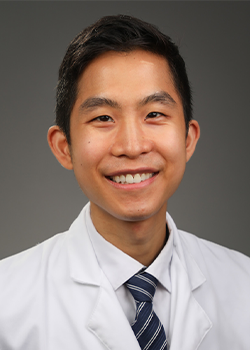
Lee conceptualized a narrative medicine project, “Untold Stories,” with a DOC colleague, Katherine Henderson, MDiv, BCC, a senior clinical administrative chaplain, and secured funding from Duke’s Trent Center for Bioethics, Humanities & History of Medicine.
Since the project’s inception in 2022, they and a few other clinicians have been collecting DOC patients’ stories through audio interviews and co-creating photographic portraits of the patient participants, with the patients’ permission and in collaboration with them. Henderson, clinical social worker Elissa Nickolopoulos, MSW, LCSW, and medical student Michelle Tang conduct the interviews, and Lee takes the photos in the setting and style of the patient’s choosing.
“Narrative medicine is a way of approaching medical care that focuses beyond the biomedical model; it seeks to understand the patient’s unique social circumstances and experience of their illness,” noted Lee, now a fifth-year resident. “By understanding who our patients are beyond their identity as patients, doctors are more likely to take an empathic approach when conflicts in the doctor-patient relationship arise.” He adds that a clearer understanding of patients’ stories can also help clinicians reduce bias and challenge assumptions about their patients.
And the power of narrative medicine extends beyond clinicians to patients. Henderson explains, “The idea is that you are facilitating the ‘coming to voice’ of someone’s personal experience, and that in itself is an empowering intervention. We are offering some of the dignity back to the patient, and we are offering them the power to tell us what they know as the expert in their own lives, versus what our assessment of their condition is.”
Henderson notes that a growing body of literature shows that taking a narrative medicine approach improves both patient wellbeing and patient satisfaction.
Six of the patients’ portraits, along with excerpts from their audio stories, are available on the Untold Stories website following the exhibit opening at the Duke Medical Center Library & Archives. Several other patients will be featured on the website as the project continues.
While each patient who shared their story has traveled their own path, Lee and Henderson noticed a few common themes across the narratives: joy, connection, and hope even through extremely difficult circumstances; spiritual faith as a grounding force; and the power of compassion in medicine.
In addition to documenting patient stories and co-creating portraits, the team has developed and begun delivering an intervention for clinicians, students, trainees, and clinic staff to foster a more holistic approach to patient care.
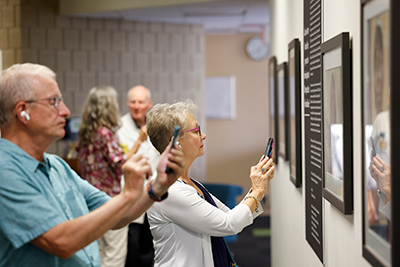
In the one-hour session, participants are first introduced to a patient’s electronic health record, then to their portrait, and finally to an excerpt from their audio story. Time for reflection and discussion is built into each segment as participants gradually develop a fuller picture of the patient and consider their own and others’ observations in the context of their clinical work.
Lee’s understanding of the project’s impact has evolved over the past few years. “This project was initially my attempt to try and increase empathy for patients, but I also realized it was a space for patients to tell their stories—their unheard stories, oftentimes—in a healthcare system that often doesn’t allow for many of those opportunities. And to better understand this underserved patient population and highlight the structural barriers that people are facing when they're navigating the healthcare system.”
The exhibit is open to the public 8 a.m. to 5 p.m. daily on the third floor of the Duke University Medical Center Library & Archives (Seeley G. Mudd Building) through at least the end of the year.
The Untold Stories project team also includes John David Ike, MD, assistant professor of medicine; and Jane Gagliardi, MD, MHS, associate dean for learning environment and well-being, professor of psychiatry and behavioral Sciences, and professor of medicine.
Untold Stories is also funded in part by Duke Signature Care.
Susan Gallagher is the director of communications for the Department of Psychiatry & Behavioral Sciences.
Patient Stories
Tiffany King
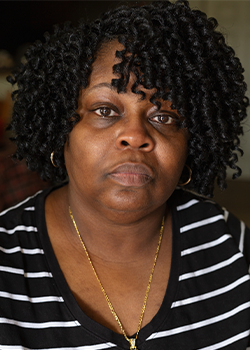
What prompted you to participate in this project?
“I want to tell my story of how my son’s life was taken. I tell everybody, ‘His life mattered too.’ And I want everybody to know, my son's life was taken in 2020, unfortunately. His name is Maurice. He was 34. Four individuals took his life. He has three kids, Jewels, Y’anna, and Malik. They love him and miss him to death. My son was gentle, kind, he was high-spirited. He would take the shirt off his back and give it to you.”
How do you feel about having shared your story?
“I feel abundantly blessed to have my story out there. Because, like I said, my son’s life mattered. And I want his life, his legacy, to live on.”
Read or listen to more of Tiffany’s story
Bonita Williams
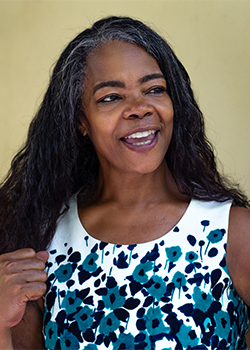
What was it like to share your story through this project?
“[Sharing my story] was great. It felt good to be heard. Because it felt like, when my mom passed, people were there for the moment, and then everybody disappeared. Nobody calls, nobody checks on you. It’s like nobody cares. And to get my story out with Dr. Lee and Katherine, it’s like I was sharing my mom with people.”
What do you feel like you got out of participating in the project?
“Sharing my story that may help someone else, that means a lot to me that someone else may get something from what I’ve shared. And just being brave enough to share, because grief is hard to share. It’s very vulnerable, and I’m not afraid of being vulnerable.”
Read or listen to more of Bonita’s story
Genora Williams
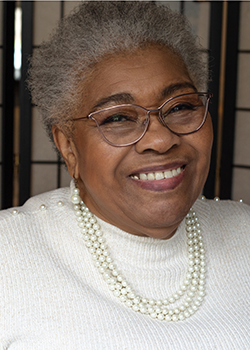
What prompted you to participate in this project?
“I thought what I was experiencing would help somebody else. And it really helped me to deal with the death of my son … I was able to open up and tell some things that I wasn't able to share before.”
What helped you be able to share those things with Katherine and with Dr. Lee?
“They listened. And they’re trained to listen. And they also hear us, what we are saying.”
